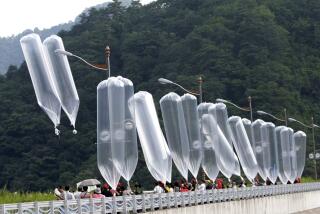Japan Crackdown Could Cut N. Korea Funds
- Share via
TOKYO — As Tokyo investigators attempt to follow a trail of candy wrappers, life preservers and high-caliber ammunition back to Pyongyang, Japan’s stepped-up response to a suspected North Korean spy ship threatens to close off a key funding source for the desperate regime.
“This time, Japan’s coast guard did well,” said Katsuei Hirasawa, a Japanese lawmaker with the ruling Liberal Democratic Party. “North Korea is like a cornered mouse trying to bite a cat.”
Japan has long put up with North Korean incursions into its territorial waters, so in one sense the pursuit that ended Saturday was hardly extraordinary. What was unprecedented, however, was Japan’s show of force after the purported fishing boat refused to stop. This time, Japanese coast guard vessels and military aircraft tracked the mystery ship, surrounded it and returned fire in a confrontation that ultimately led to the boat’s sinking.
Analysts say Tokyo’s new, tougher line is likely to make it far more difficult for North Korea to smuggle illegal narcotics and other contraband into Japan--the suspected mission of this vessel--which has been a longtime source of hard currency for the regime.
The confrontation also comes as Tokyo cracks down on other domestic sources of the money North Korea needs to keep alive its tottering regime and fund “Dear Leader” Kim Jong Il’s taste for luxury goods.
“I think Japan’s response this time was a bit of a rude awakening for North Korea,” said Ralph A. Cossa, head of the Honolulu-based Pacific Forum Center for Strategic and International Studies. “It’s going to be a lot harder in the future for North Korea to milk money from Japan.”
North Korean finances are watched closely in Washington, Tokyo and Seoul for signals on how close the regime might be to collapsing and how much money it has to purchase components for its weapons program.
Ministers, military analysts and the media have spent the last several days poring over the clues left by the 100-foot mystery ship, which was marked as a Chinese long-line fishing vessel when it was first sighted Friday.
Japan announced this week that it would even consider raising the vessel, now 300 feet below sea level, to collect more evidence.
China said the vessel is not one of its own, while North Korea indignantly denied that the ship was a North Korean spy vessel. Breaking five days of silence over the incident, the North’s official Korean Central News Agency accused Japan of piracy and terrorism.
“This was an incident unprecedented in history,” the news agency said. “This crime committed in another country’s territorial waters is nothing but brutal piracy and unpardonable terrorism that could be committed only by samurais of Japan in defiance of international law.”
Among the clues Japan says has emerged so far: a candy wrapper and a life preserver with Korean script, recovered from two of the bodies, and the ship’s design, which featured the engine near the bow. That unusual layout, seen in previous North Korean spy vessels, allows small boats and spies to more easily move off the stern.
Other circumstantial evidence includes the fact that the 15 men on board exhibited military precision when a fire broke out, turning away from the wind and displaying well-practiced teamwork in quickly putting it out. They then fired 145 highly accurate shots from machine guns after receiving a signal from another crew member. They also fired two shoulder-mounted mortars that missed their pursuers.
Finally, an explosion and the vessel’s rapid sinking about 250 miles off an island in Kagoshima prefecture suggest that the crew scuttled the ship and committed suicide after it became clear there was no escape. Three Japanese coast guard officials were injured.
Although Japan exhibited much greater resolve in protecting its waters than it did in dozens of similar past incursions, its training and crisis-management abilities left much to be desired.
According to media reports, Japan didn’t notice the ship itself but was alerted by the United States. It then took nearly nine hours for the Japanese military to notify the nation’s coast guard. Guidelines on interagency cooperation put together after a similar incident in March 1999 were disregarded on a number of other counts. Basic photography equipment didn’t work, it took four days to clear the paperwork for autopsies, and even Prime Minister Junichiro Koizumi complained of being left out of the loop.
Still, the fact that the intruder was stopped decisively after decades of de facto nonconfrontation sends a strong signal that is likely to further limit North Korea’s maneuvering room, analysts say. “Japan’s been a real wimp,” lawmaker Hirasawa said.
During the height of Japan’s “bubble” economy in the late 1980s, nearly $2 billion flowed annually from Japan to North Korea, estimates Tsutomu Nishioka, editor with the Modern Korea Institute, a think tank in Tokyo.
Though Japan remains a vital source of cash, the flows are down more than 90%, he said, in part because of Japan’s own prolonged recession. “North Korea’s usual money sources like pachinko and yakiniku restaurants are drying up,” he said. “They’re getting desperate.”
These two industries are economic mainstays for millions of Japanese residents of North Korean descent--the traditional source of much of the funding sent back to the homeland.
But pachinko, a pinball gambling game with annual revenues of more than $200 billion--more than Japan’s auto industry--saw business decline 25% between 1995 and 1999. In recent years, operators also have come under growing police pressure to use prepaid cards, making it more difficult to siphon off cash. And “‘mad cow” disease has devastated the yakiniku business, the Korean grilled meat restaurant industry.
Even if these sources wanted to send money, tighter financial controls enacted after Sept. 11 at the behest of Washington are making bank transfers to suspected terrorist states more difficult.
On top of that, stepped-up investigations by Japanese financial regulators of Chogin, the largest North Korean-linked bank in Japan, are expected to further stem the flow.
In response to Tokyo’s tougher line against the Chogin banking group, Pyongyang accused Japan of waging an anti-North Korea campaign. It also said that in retaliation, it would suspend the two-year search for Japanese citizens living in North Korea whom its own government is suspected of kidnapping.
“I wasn’t surprised to hear they would stop searching,” said Kayoko Arimoto, 75, the mother of a suspected abductee who disappeared from Denmark 18 years ago. “Nothing’s changed. They didn’t want to search anyway.”
*
Times staff writer Barbara Demick in Seoul and Hisako Ueno in The Times’ Tokyo Bureau contributed to this report.
More to Read
Sign up for Essential California
The most important California stories and recommendations in your inbox every morning.
You may occasionally receive promotional content from the Los Angeles Times.













